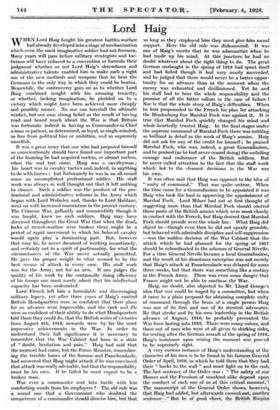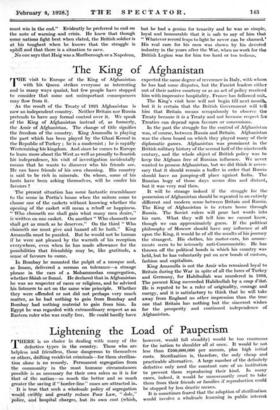Lord Haig
'UTHEN Lord Haig fought his greatest battles warfare had already developed into a stage of mechanization which even the most imaginative soldier had not foreseen. Many years will pass before military strategists and tac- ticians will have reduced to a convention or formula their judgment whether or not Lord Haig's shrewdness and administrative talents enabled him to make such a right use of the new methods and weapons that he beat the Germans in the only way in which they could be beaten. Meanwhile, the controversy goes on as to whether Lord Haig combined insight with his amazing tenacity, or whether, lacking imagination, he plodded on to a victory which might have been achieved more cheaply and possibly sooner. No one can forestall the ultimate verdict, but our own strong belief as the result of having read and heard much about the War is that Britain was fortunate indeed in having as Commander-in-Chief a man so patient, so determined, so loyal, so single-minded, so free from political bias or ambition, and so supremely unselfish.
It was a great irony that one who had prepared himself so conscientiously should have found one important part of the learning he had acquired useless, or almost useless, when the real test came. Haig was a cavalryman ; his heart was in cavalry tactics and, indeed, in anything to do with horses ; but fortunately he was in an all-round sense an accomplished professional soldier.. His staff work was always so well thought out that it left nothing to chance. Such a soldier was the product of the pro- fessional and administrative reforms in the Army which began with Lord Wolseley and, thanks to Lord Haldane, went on with increased momentum in the present century. The Crimean War, gallantly and resourcefully though it was fought, knew no such soldiers. Haig may have dreamed throughout the Great War that when the dead, locks of trench-warfare were broken there might be a period of rapid movement in which his beloved cavalry would again play a dominating part. But, however that may be, he never dreamed of working incautiously, and certainly not in a spirit of partisanship, for what the circumstances of the War never actually permitted. -He gave the proper weight to what seemed to be the best means of attack in every case. His staff work was for the Army, not for an arm. If one judges the quality of his work by the continually rising efficiency of his troops one must surely admit that his intellectual capacity has been underrated.
Lord French left him a formidable and discouraging military legacy, yet after three years of Haig's control British Headquarters were so confident that their plans for an advance were impeccable, and the rank and file were so confident of their ability to do what Headquarters told them they could do, that the British series of victories from August 8th, 1918, onwards were by far the most impressive achievements in the War. In order to understand their full significance it is necessary to remember that the War Cabinet had been in a state of " doubt, hesitation and pain." Haig had said that the moment had come, but the Prime Minister, remember- ing the terrible losses of the Somme and Passchendaele, had answered that Haig might attack if he was convinced that attack was really advisable, but that the responsibility must be his own. If he failed he must expect to be a broken man.
Was ever a commander sent into battle with less comforting words from his employers ? The old rule was a sound one that a Government who doubted the competence of a commander should dismiss him, but that so long as they employed him they must give him moral support. Here the old rule was dishonoured. It was one of Haig's merits that he was adamantine when he had made up his mind. At this juncture he had no doubt whatever about the right thing to do. The great German onslaught in the spring of 1918 had spent itself and had failed though it had very nearly succeeded, and he judged that there would never be a better oppor- tunity for an advance than at the moment when the enemy was exhausted and disillusioned. Yet he and his staff had to bear the whole responsibility and the promise of all the bitter odium in the case of failure ! Nor is that the whole story of Haig's difficulties. When he first propounded to the French his plan for attacking the Hindenburg line Marshal Foch was against it. It is true that Marshal Foch quickly changed his mind and wholeheartedly trusted Haig. In the final stages under the supreme command of Marshal Foch there was nothing so brilliant in detail as the work of Haig's armies. Haig did not ask for any of the credit for himself ; he praised Marshal Foch,- who was, indeed, a great Generalissimo, and he praised (as he had never ceased doing) the unfailing courage and endurance of the British soldiers. But he never called attention to the fact that the staff work which led to the cleanest decisions in the War was his own.
It was often said that Haig was opposed to the idea of " unity of command." That was quite untrue. When the time came for a Generalissimo to be appointed it was Haig who took the lead in approving the appointment of Marshal Foch. Lord Milner had not at first thought of suggesting more than that Marshal Foch should control those parts of the. British armies which were most closely- in contact with the French, but Haig desired that Marshal Foch should preside over the whole line. What Haig did object to—though even then he did not openly grumble, but behaved with admirable discipline and self-suppression —was the sudden decision of the War Cabinet that the attack which he had planned for the spring of 1917 should be subordinated to the schemes of General Nivelle. For a time General Nivelle became a local Generalissimo, and the result of his disastrous enterprise was not merely. that Haig's attack at Passehendaele was delayed for some three weeks, but that there was something like a mutiny in the French Army. There was even some danger that France might not be able to continue the War.
Haig, no doubt, also objected to Mr. Lloyd George's idea that war could be waged by a committee, but when it came to a plain proposal for obtaining complete unity of command through the brain of a single person Haig was one of its first and one of its stoutest advocates. By that stroke and by his own leadership in the British advance of August, 1918, he probably prevented the. War from lasting into 1919. There were many voices, and those not of men who were at all given to shirking risks, for resting after the German assault of the spring of 19184 Haig's insistence upon seizing the moment was proved to be supremely right.
A very curious instance of Haig's understanding of the character of his men is to be found in his famous Generai Order of April, 1918, in which he told them that they had. their " backs to the wall " and must fight on to the end. The last sentence of the Order was : " The safety of out Homes and the Freedom of mankind alike depend upon the conduct of each one of us at this critical moment?! The manuscript of the General Order shows, however* that Haig had added, but afterwards crossed out, another sentence—" But be of good cheer, the British Empire must win in the end." Evidently he preferred to end on the note of warning-and crisis. He knew that though some nations fight best when elated, the British soldier is at his toughest when he knows that the struggle is uphill and that there is a situation to save.
No one says that Haig was a Marlborough or a Napoleon, but he had a genius for tenacity and he was so simple, loyal and honourable that it is safe to say of him that Whatever record leaps to light he never can be shamed.' His real care for his men was shown by his devoted industry in the years after the War, when no work for the British Legion was for him too hard or too tedious.







































 Previous page
Previous page